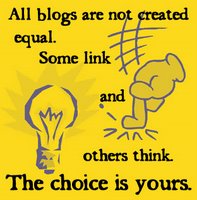
During the 1830s, as Jacksonian democracy began its brilliant upsurge in the United States, as the grazing multitude – humanity’s sorry masses – gained a voice, a great many old-guard politicians and intellectuals feared for the future of the country. They hoped to hold onto a polity where the wisest and best among themselves would selflessly rule for the good of the nation; eminent political leader George Cabot wrote that Democracy is “the government of the worst.” They feared the voice of the unruly masses. Blogs threaten the Old Light media, and when reading The New Republic’s cover article Technobabble on “the idiocies and dangers” of the blogosphere, it’s tough not to think of the mid-1800s gentry squawking with horror as they witnessed the rise of democracy. Christen Rosen, editor of the journal The New Atlantis, remarks in The New Republic that blogs reside, “in a world where technology can be harnessed by any semi-literate with a PC.” And that the blogging hero is “the guy without any expertise who can see through the palaver of elites… [Bloggers have] taken figures who have been historic punch lines--the dilettante, the hack--and turned them into civilizational saviors. It's a brave new world.” The Old Media has many faults, not least, as Ms. Rosen so nicely shows us, its stuffy elitism and arrogance. So, as the monied pessimists at this nation's democratic beginnings were wrong to prophesize doom with their pens as the voices of the people rose to power, the New Republic is wrong. To fear the voice of the people is wrong. Dare I say, it's unpatriotic? How is the blogosphere democratic? To begin, blogs function along the rich spectrum of individual experience -- vivid hopes and dreams -- that makes a democratic system function from bottom up. Blogs start with the person. In contrast, the Old Media works from the top down; it must serve two corpulent masters: the conglomerates and politicians and celebrities whom it snacks on cocktail weenies with and the people whom it mesmerizes with fairytales and picture-perfect realities. Old Media thus is a system where free-thought is only collateral damage; thought as a goal doesn’t help ratings or push papers. Diversity of opinion seems to be the only combative force to this myopia. Blogs – like democracy – thrive on diversity. People of various agendas and abilities can voice their opinions; the good ideas are linked to and debated and the bad ideas die ignored. Elitism within a government or within a media system is bad because liberty and freedom and power of the people and truth can be sacrificed for the parochial good of the leader. This cannot happen in a democracy. This cannot happen in the blogosphere. That being said, an Army of Davids (the amateur blog-based journalists of today) relegating the Old Media to the dustbins of history, as conservative Glenn Reynolds and liberal Markos Moulitsas alike triumphantly predict, is quite simply poppycock, absurd prophesies of a self-congratulatory bunch. A direct democracy ruled completely by the people is patently absurd; a “we-dia” ruled by the inchoate blogosphere too is preposterous. First, bloggers are a parasitic bunch. Without the The New York Times, the blogosphere is left with nothing but anecdote posts about eating cereal and family vacations. As far as news goes, the Old Media provides the facts and the New Media improvises vantage points. Second, very importantly, the blogosphere as a concept – as a check against the nation’s elite power institutions – is no doubt important, but the blogosphere as a reality – the vast majority of its constituent soldiers communicating with sentence fragments and lower case Is – is not intellectually self-sufficient nor is it progressive. Just because (as newspaper circulation suggests) the Old Media is dying out, that doesn’t make it right; indeed, it ought to be a truism by now that the free-market is a dangerous judge of intellectualism. America tunes to Fox News for their information, after all. The vacuous reality of the blogosphere can be summed in a nice aphormism: there are those who link and those who think. Glenn Renolds’ Instapundit, for example, embodies the analysis-free "linking platform," updated about a ten thousand times a day, that dominates the blogosphere. This logorrhea and emptiness is useful as a filtration device for distilling what is valuable within the contours of the web, but it is a rambling, pitiful excuse for political insight. Blogs that do provide sincere thought are too often amateurish and insignificant, and, regardless, recieve far fewer visitors. The fuzzy feeling enjoyed when one conquers a 12 page Harper’s Magazine article, flowing with lapidary prose and delicately founded on well-contemplated analysis, is a warm satisfaction not often replicated in the blogosphere. Instead, you link to links that link to (presumably) more links. However, the fact that blogs will never replace the Old Media misses the point. Democracy doesn’t necessitate editors or fact-checkers and it doesn’t guarantee quality on a microscale. Instead, it affords the eclectic and perhaps incendiary genius the voice to question the status quo – and his ideas to be scrutinized by the ubiquitous hands of public criticism. The blogger, uncontracted and unremunerated, can freely contribute his unique understandings, and the democractic dynamic thrives. Sure, the voice worth hearing might be quite rare – but with 10 million blogs and a great many more soon to come, that’s a risk I’m willing to take. If you can stomach more blog self-contemplation, check out: In Defense of Internet Speech
No comments:
Post a Comment